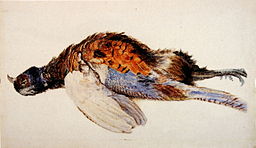 Ruth Harkness is best known as the woman who brought (hand-carried) the first giant baby panda to the United States. But Ruth was also an adventuress of the table. Here she tells of a meal one might consider . . . excessive . . .
Ruth Harkness is best known as the woman who brought (hand-carried) the first giant baby panda to the United States. But Ruth was also an adventuress of the table. Here she tells of a meal one might consider . . . excessive . . .
I think that in all my explorations of eating by far the most extravagant was the winter in which I ate an estimated ten thousand dollars’ worth of rare pheasants. At least, after the expression of astonishment finally faded from the face of Robert Bean, curator of birds and mammals for the Chicago Zoological Society, when I told him about the tragopans, Lady Amhersts, and impeyans, and others the names of which I did not know, that had been served to me by my Chinese cook, he said, “Well, if they could have been brought to Chicago, I think ten thousand would have been a modest price for them.”
But of that there could have been no possibility, because the scene of my solitary banqueting was in far Western China in the Tibetan foothills, where I spent a winter in a crumbling old lamasery from which all the monks had fled during the rout of the defeated Chinese Communist armies. And war raged over China, so that travel with or without pheasants was well-nigh impossible. Besides which, any fancier of pheasants will tell you that these birds, which live at altitudes of 8,000 feet and more, are most difficult to transport alive from their mountains.
To read this story in full, go to Gourmet archives 1944

